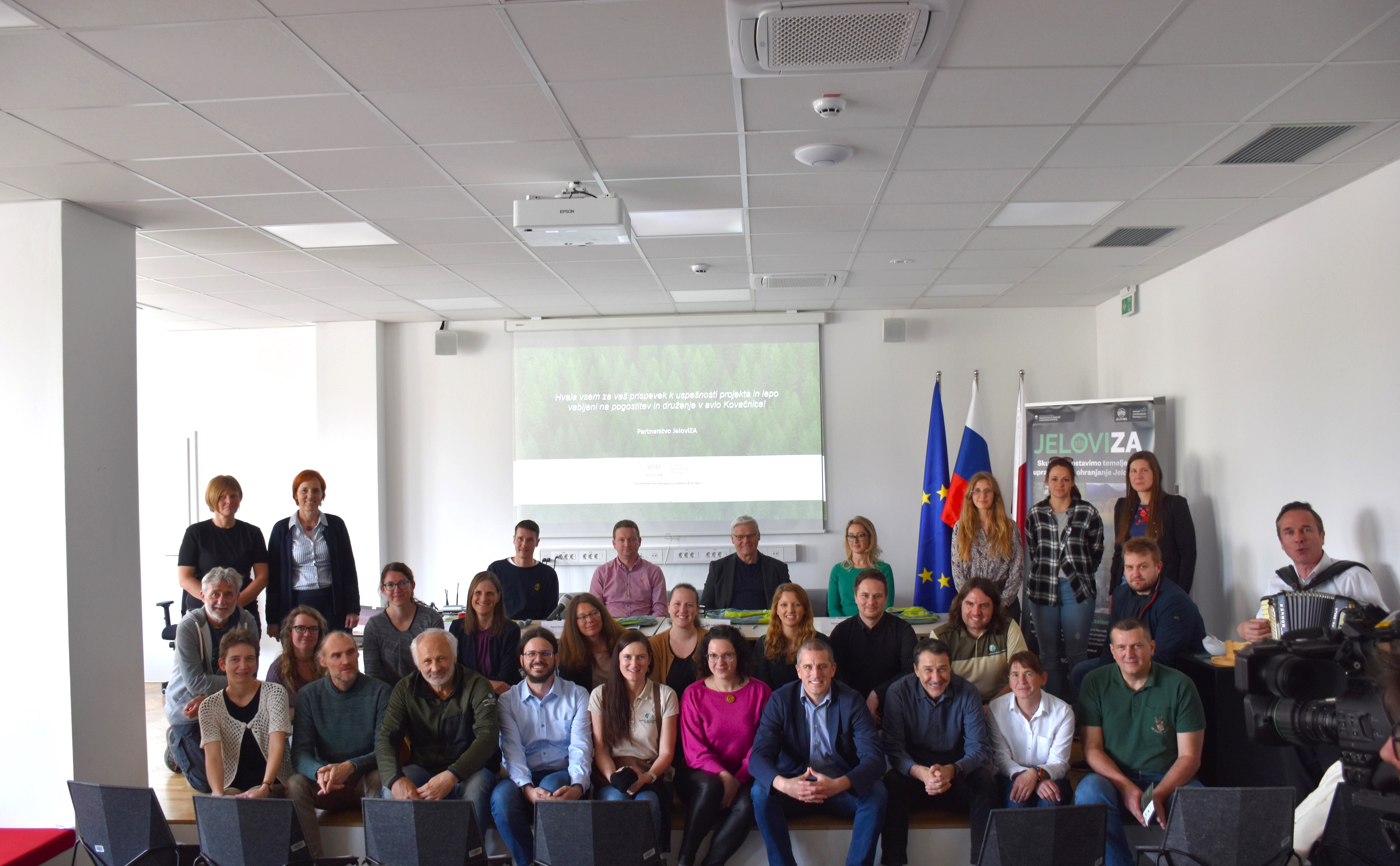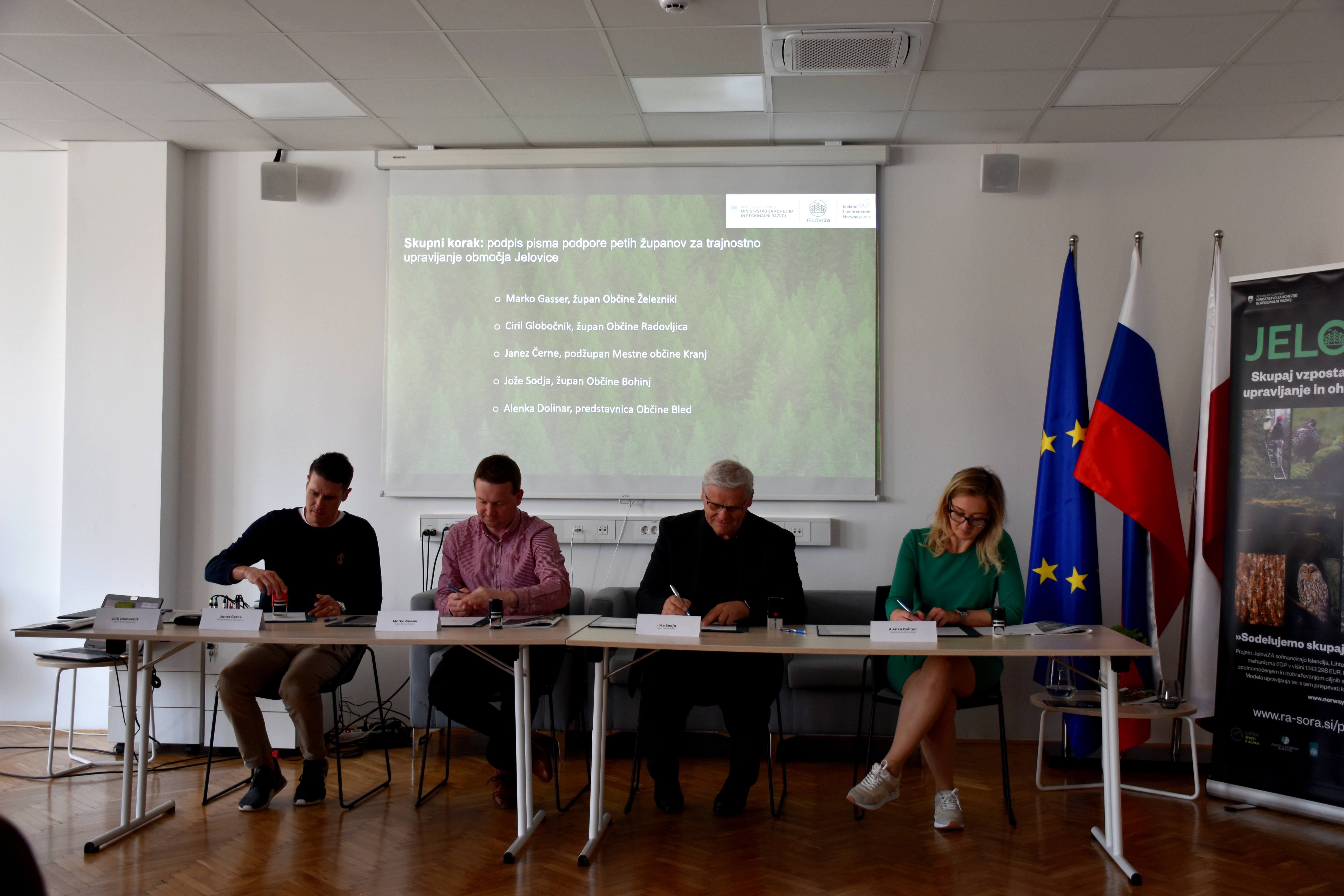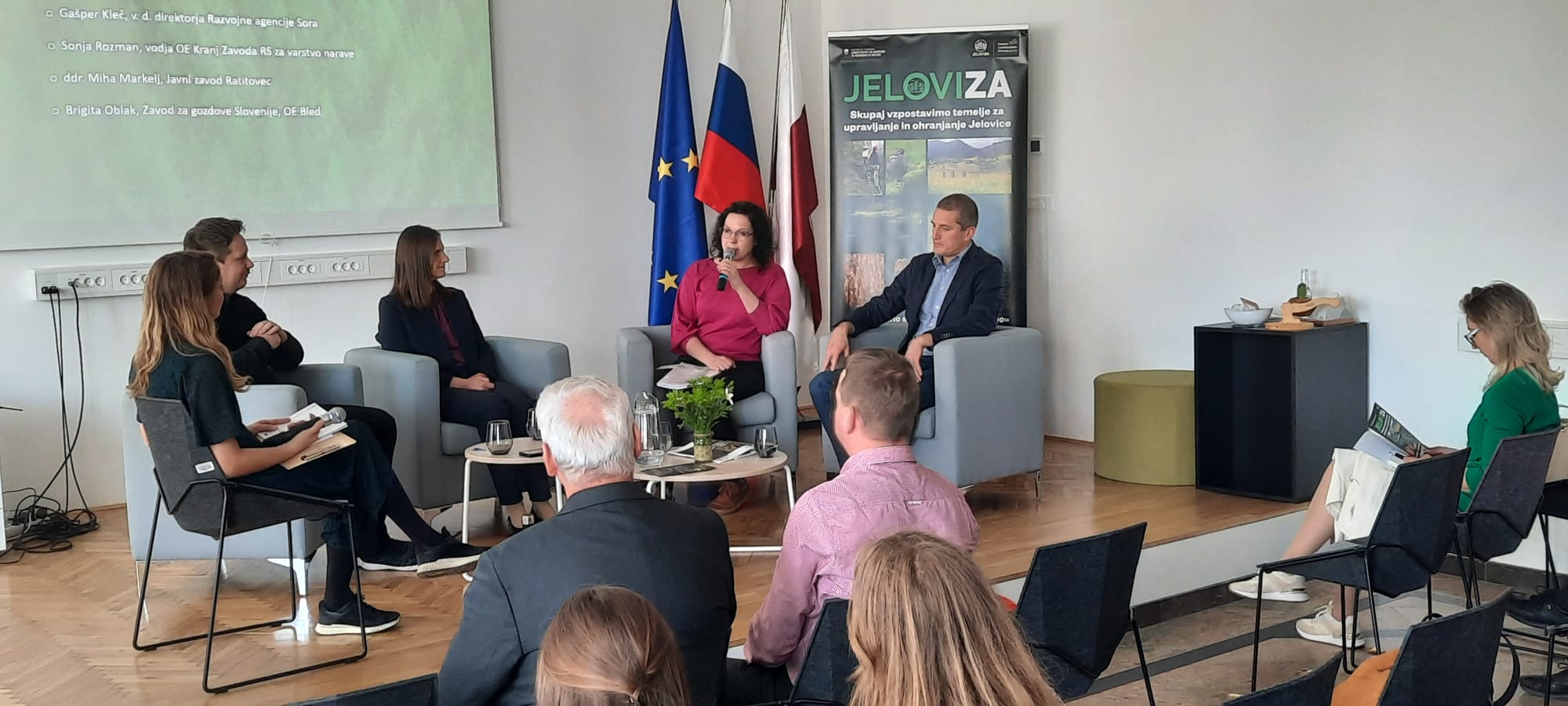
11 April 2024 – In Kranj, the mayors of five municipalities from the Gorenjska region, which share the area of the pre-Alpine Karst plateau of Jelovica, signed a letter of support for the Jelovica Management Model. The vision for the conservation and development of the area has been developed over the last two years within the JeloviZA project.
The Mayor of Bohinj, Jože Sodja, stressed at the signing of the letter of support for the sustainable development of Jelovica that “this signature was necessary and urgent, and it is right that we have done it.” The purpose of the signature is to “keep Jelovica mysterious, green and for people who know how to manage it.”
The Vice-Mayor of Kranj, Janez Černe, highlighted the good example of cooperation between municipalities and partners. Mayor of Železniki, Marko Gasser, pointed out that the Management Model will have to be implemented in practice and stressed the importance of redirecting people to the peripheral areas of Jelovica. The signatures of support were also signed by the Mayor of Radovljica, Ciril Globočnik, and on behalf of the Mayor of Bled, Alenka Dolinar.

Jelovica is one of the most diverse and well-preserved parts of Slovenian nature. Due to human activities and climate change, the area of Jelovica and its inhabitants face natural disasters, which can be mitigated, and their impact reduced through proper management of the area. Within the JeloviZA project, the project partners carried out reforestation activities, which included the planting of more than 24.000 new trees and the exclusion of 30 habitat trees from commercial use, thus improving the diversity of habitats for animal species. 25 new nest boxes for Ural owls were installed and for the first-time monitoring of the Eurasian capercaillie was carried out using telemetry on Jelovica. Training sessions, workshops and guided tours for different stakeholders were also an important part of the project. These activities were aimed at discussing and exchanging views on the future of Jelovica. More than 140 people participated in all these activities.
The project is also important in terms of strengthening cooperation between different sectors at local and national level, in affiliation with the local population. Therefore, the project represents an important starting point for a more cohesive approach to the future management of the area, with an objective of tackling challenges and finding solutions together.
At the beginning of the event, the key results of the project were presented by Metod Rogelj, Institute of the Republic of Slovenia for Nature Conservation, Dr Irena Mrak, Slovenia Forest Service, Kristina Stakne, CIPRA Slovenia, Association for the Protection of the Alps, Anita Pokorn Oman, Sora Development Agency, and Andraž Valcl from the Municipality of Železniki.

“The main aspect of the project is networking and connecting,” emphasised Kristina Stakne from CIPRA Slovenia, Association for the Protection of the Alps, which is also the project promoter of the project JeloviZA. She said that during their study visit to Austria, they learned about the importance of successful management and the need to connect well with tradition and local culture. To transfer this knowledge to the stakeholders living and working around Jelovica, workshops on heritage interpretation and tourism in the forest area were organised.
According to Andraž Valcl from the Municipality of Železniki, Jelovica is a very homogeneous geographical area, but administratively very fragmented. The problems that arise are the same everywhere, so it makes sense for the municipalities to work together to find solutions. “The desire is to establish some kind of permanent contact or communication,” he added.
Metod Rogelj from the Institute of the Republic of Slovenia for Nature Conservation said that the project was looking for solutions to various problems, talking to people about what bothers them and what they would and would not like to see in the Jelovica area in the future. They stressed the importance of cooperation, keeping the quietness in nature and re-directing the visitors. “Jelovica will never be a reserve. This is not a wish either. There will always be certain activities in Jelovica, but they must be created in a way that is good for visitors, nature, owners, and locals,” he explained.
The event also featured an interesting panel discussion where Gašper Kleč, Acting Director of the Sora Development Agency, pointed out that “the JeloviZA project is an example of how diverse partners can work together to solve a common challenge, which makes it all the more important that the project has been actively joined by the municipalities and, above all, that the work that has been set out is being taken forward in the context of the proposed consultative body for Jelovica.”
Brigita Oblak from the Slovenian Forest Service presented the challenges of forest management in the light of climate change and the alarming forecasts for the European Bark beetle, which is considered one of the most important biotic damaging factors in our forests. “On average per year, around 30.000 m3 of timber is cut down in the area of Jelovica, but in 2019 and 2020, when the sleet hit and afterward the bark beetles, as much as 180.000 m3 was cut down per year. This makes it even more important that we strengthen the Jelovica forest. and, Within the JeloviZA project, the project partners have increased its resilience to weather events and other impacts of climate change by planting traditional tree species typical of Jelovica, such as beech, fir and sycamore maple,” she pointed out.

The JeloviZA project, which is supported by the EEA Financial Mechanism, is co-created by the Sora Development Agency, Institute of the Republic of Slovenia for Nature Conservation, Slovenia Forest Service, the Municipality of Železniki, CIPRA International and the project promoter, the CIPRA Slovenia, Association for the Protection of the Alps.
SOURCE: Sora Development Agency